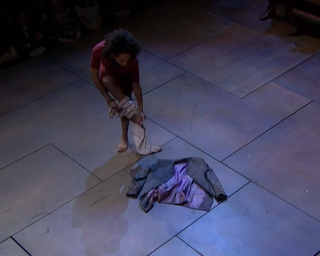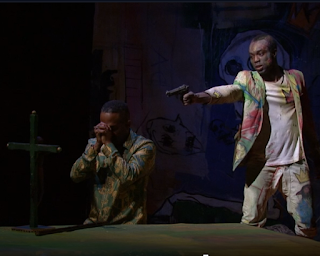Act IV, scene v: The poison of deep grief
Gertrude determines 'I will not speak with her' (IV.v.1) but is persuaded to 'Let her come in' (IV.iv.16) just fifteen lines later - after the indirect threat to Hamlet that Ophelia 'may strew/Dangerous conjectures in ill-breeding minds' (IV.v.14-15). There is evidently sufficient sense in the things that Ophelia says to cause trouble for the King. (It is worth remembering that the the handling of Polonius' death is causing political tensions and adding to the civil unrest.)
Ophelia enacts being mad with grief, and matches the description that she 'Speaks much of her father' (IV.v.4), but does so mostly through song. She leaves just prior to the arrival of a livid Laertes, so now we have a third angry young man, who also wishes to be 'reveng'd/Most throughly for my father' (IV.v.135-136).
Laertes is on the verge of being placated by Claudius when his sister returns and Laertes witnesses her desperate, pitiful condition, ' Hadst thou wits and didst persuade revenge/It could not move thus' (IV.v.167-168).
It can be visually very striking as Ophelia distributes flowers (real, dead or imagined) perhaps to those assembled on stage, or perhaps to her absent lover - there is certainly an echo of her earlier actions in Act III with Hamlet, triggered in the word 'remembrance' (IV.v.173).
'My Lord, I have remembrances of yours/That I have long'd to redeliver' (III.i.93-94). There is a tradition that certain flowers are given to certain characters (though not indicated directly in the stage directions), and flower symbolism was certainly significant at this time. There is a particularly poignant conclusion to her speech, 'I would give you some violets, but they withered all when my father died' (IV.v.181-182).
'My Lord, I have remembrances of yours/That I have long'd to redeliver' (III.i.93-94). There is a tradition that certain flowers are given to certain characters (though not indicated directly in the stage directions), and flower symbolism was certainly significant at this time. There is a particularly poignant conclusion to her speech, 'I would give you some violets, but they withered all when my father died' (IV.v.181-182).
- Given the traditional symbolic value of the different flowers listed below, which would you have Ophelia give to each character?
- Read this British Library article by Elaine Showalter, which explores some of the changing representations of Ophelia over time. Collect visual images from some of the productions that she mentions, and others that you encounter. Which appeal to you most, and why?
- Rosemary and Pansies: Ophelia cites them as being for remembrance and thoughts.
- Fennel and Columbine: Fennel is the symbol for flattery and columbine is considered the flower for “deceived lovers,” a symbol of male adultery and faithlessness.
- Rue: Rue is the symbol for bitterness, thought to be the cause of most abortions in that day, and often connected with adultery.
- Daisy: Symbol of innocence and gentleness.
- Violets: For faithfulness and fidelity.
And I have included stills from two films where flowers are symbolic or important...





Comments
Post a Comment